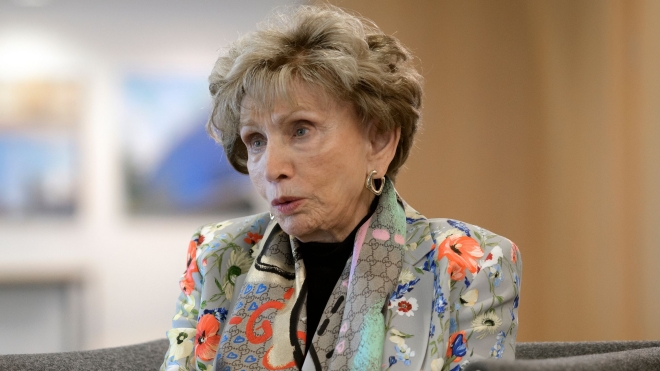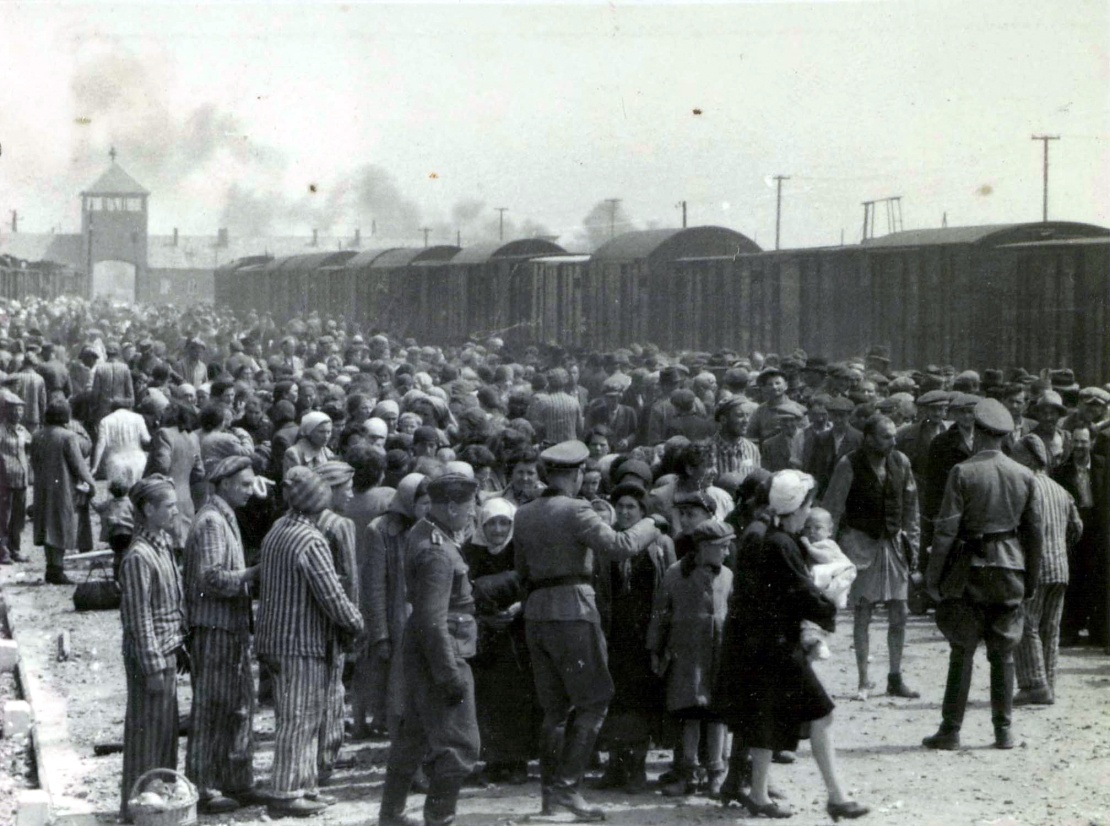As we know, you are closely following the news from Ukraine and what it goes through. In your opinion, are there any specific features of this war? What advice do you have for people who`ve been affected by hostilities?
You werenʼt prepared to what is happening, you are dealing with the unexpected. And before you say or do anything in this situation, ask yourself –– is it necessary? Is it important? And, most important, is it kind? I think this is the time to practice kindness, to do what is humanly possible. And then you hand this approach over to other people. Thatʼs what I did. I looked at Auschwitz as an opportunity to really find that survival inside. That you never ever think of giving up even when your life is taken from you, because you can stand it. Yes, you may not like some concrete situation, but itʼs temporary. Everything is temporary, including life.
For me, I know that at my dead bed I`ll be very happy. Because I thought not about what the world can give me, but what I can do to be a good person. When I was liberated, I felt somebody holding my hand. I looked up and all I saw was a big lip. I`ve never seen a person of color before, and later, when I was interviewed by Oprah [Winfrey] and told her that, she jumped up and said "He was black!" Iʼm sure enough he was. His eyes were full of tears, and his hand was full of M&Mʼs. So just remember: circumstances you are now is a school room, youʼre learning, and no matter what happens, it will make you stronger.
A lot of Ukrainians live in a reality that we don’t know anything about about our future. We’re afraid of mobilization in Russia now, and the possibility of it using the tactical nuclear weapon. You also lived in a concentration camp when you didn’t know anything about your future. How to deal with fear and the unknown?
I think you may have anxiety and I can tell you that you can turn anxiety into a state of discovery. You’re going to find what life is from the inside out, don’t depend on someone outside of you to come and liberate you. You liberate yourself. Yes, you’re limited, but you’re a human being and you accept the fact that you can do what you can do the way you can in your very limited capacity.
How did you manage not to lose your hope in the camp?
My boyfriend [before we were separated and put in camps] told me that I have beautiful eyes and hands. And I was reminding this to myself –– I actually asked everybody to tell me about my hands and eyes. I said, if I survive today, then tomorrow I’ll be free. In our beautiful world all you have to do is just live life one day at a time. You know, life is about one day.
You can truly control just one thing –– your expectations. Don’t expect more of you than you can have. Give up perfectionism, because it can lead to procrastination. I don’t know if youʼve read Gone with the Wind, when she says: "Iʼll think about it tomorrow". Don’t think about it tomorrow, see what you can do at this minute. Don’t say: "Why didn’t I do that, how could I do that". Don’t get you serving such a frame of mind. The frame of mind is: "Yes, I am, yes, I can, yes, I will".
Prisoners in Auschwitz, May 27, 1944.
Getty Images / «Babel'»
But how to get the courage to make a decision?
Risk. If I come to you after this interview and I ask you to be my friend, and you tell me: "That’s very nice, but I’m really not interested". Okay, my expectations werenʼt met. Iʼm disappointed, but I’m not discouraged, so I can say one wonderful word –– "next". When a guy leaves you and he’s gone, you can say to yourself: "Next!" I think grieving is important, but you can grieve now, fear now and here to again become the whole person that you’ve been earlier, and become not depending on anything coming from the outside. And that’s when hope comes into the spotlight.
Some people in Ukraine experienced greater shocks then other people. Some of us experienced the explosions in Kyiv, some of us experienced rape and life under occupation, some experienced loss, someone’s relatives had died. How can we be compassionate with each other, even while everything is going on? Understanding the other people, who have experienced horrible trauma, even if you yourself haven’t?
I want you to do what I’m already doing with my children having dinner, when I wanna say something. I ask myself, is it important? Is it necessary? But most of all ― is it kind? I think kindness is what we’re practicing hopefully now with each other. Don’t ask “How are you?”, that’s a very stupid question. Just say “I’m so happy to see you, I missed you”. Make statements, not questions. Questions may come across as interrogation.
But for example my friend was wounded in the war, and I want to know how he is. And how I can to it without saying “How are you?”
Sometimes you want to think before you’re saying “What will I do with the answer?” Because you want to know where you’re going.
Is it better to just say a good word?
Yes. It doesn’t even matter, what kind of a feeling word youʼll say. Anything. They will correct you. Just sound like you’re sad about the situation, sounds like you’re glad about it, sounds like you’re scared about it. And they say: "Yes, I’m very scared!" And then you say: "I feel like screaming, shall we? You wanna scream now, shall we?". (screams) Let it out. You’ll feel better. What comes out of your body, will never make you ill.
You worked with war participants in Vietnam, Afghanistan and Iraq. The matter is we did not have such powerful and massive rehabilitation programs for people who took part in a war. What can we do now for our military members? How can we help them right now, just as civilians?
I remember I saw two Vietnam veterans, many years ago. They were in a fearful position: "Why me? Why is it happening to me?" And cursing, cursing God and government. On the contrary, there was the other guy, with the same symptomatology, diagnosis, prognosis, but very different responses. He said to me: "Hey, doc, I’m sitting in a wheelchair and you know what? I can see my children’s eyes much closer. I can see the flowers". And I was wearing a white coat that said: “Department of Psychiatry doctor Edith Eva Eger”, and after this I felt like the biggest imposter.
Veterans march against the Vietnam War, San Francisco, 1970.
Getty Images / «Babel'»
That must be important for them to hear "that’s okay to be angry"?
You can legitimize the anger. Don’t use the word "overcome". I don’t know what it means. I don’t forget what happened, for sure. Every moment I remember. But I did not overcome it, I came to terms with it. I don’t live in Auschwitz, I call it my challenge world, where I learned how to be a survivor and never a victim of anything or anyone in the world.
It’s good to revisit the places where you’ve been. You don’t have to actually go there, you can do it in an empty chair, do it in psychotherapy.
I think it’s very important not to allow anyone to define who you are. You’re a human being, and a wonderful human being, because you get up in the morning, and you wonder, how you can use that day, to guide out people from victimization to empowerment, from darkness to light, from present, the concentration camp that is in your own mind, and the key is in your pocket.
I would like to return a little to a question about our families. Many of women and children have gone abroad, the borders are closed now, the men are staying in Ukraine. How can these families keep an emotional connection?
It’s time to regroup. Redecide. The only one you have for a lifetime is you. So care about yourself, love yourself. This is a time to really see how you can be a good parent to you.
Getty Images / «Babel'»
When we talk about fear, most of my colleagues and friends say that they worry not for ourselves, but for our children. We don’t have a clear future for them in Ukraine now. So my question is ― how to deal with this fear and how to help?
Just like guilt is in the past, worry is in the future: "This may happen, that may happen". You worry about things that maybe never happen. Stop worrying and feeling guilty. I can only touch you now.
Write down all your fears, from the least anxiety producing to the most anxiety producing. And check it off, because you’re not born with fear, you’ve learned it. Give that fear back to whoever gave it to you.
How can we minimize stress, wherever it’s possible to do for a child who stays in a conflict zone?
Children do what they see, not what we say. So what you do is important. And, yes, we may be afraid of what is going on ― but still we can go through this. And we can scream and get angry ― and children may see this as well. It’s okay to go through the rage, there is no forgiveness without the rage. It’s okay to fist ― to fist even to God. God gives us permission to go through the pain and itʼs a very, very lasting time for the Ukrainian families when they’re not prepared to be separated. But never give up hope and see how you can still be in your heart and soul with the family.
Usually here we ask to support Babel, but now we ask to support Ukrainian children who suffer daily from the war. You can do it here or here.


